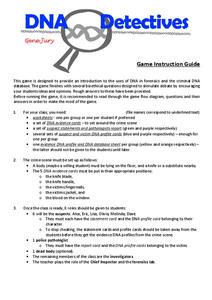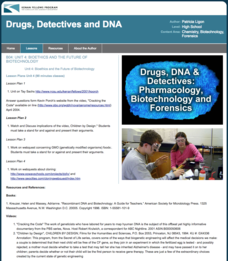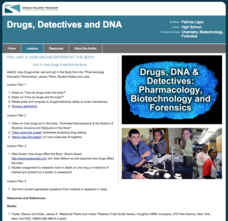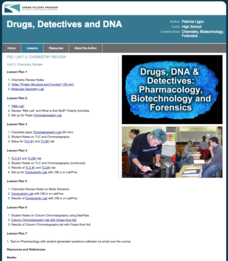Cornell University
Forensic Science: Case of the Missing Diamond Maker
Someone stole a diamond-making machine. Who done it? Scholars use forensic science at six different stations to determine the culprit. They analyze fingerprints, use their senses, and complete chemistry experiments to determine the...
Intel
Forensics: Get a Clue
Although the methods are all scientific, forensic science was started by police officers rather than scientists, who relied on observation and common sense. Young detectives use many tools to solve crimes around the school in a...
Center for Technology in Teaching and Learning
CSI: The Experience - Family Forensics
Forensic scientists depend on their observation skills to analyze evidence down to the molecular level. Middle and high schoolers practice making observations and predictions with a series of crime scene activities, which includes a...
Curated OER
Tech: Medical Forensics
High schoolers explore what it takes to be a forensic scientist or pathologist. They view a PowerPoint, discuss what education and skills are needed to succeed as a pathologist. They play a game to test their observation skills, a skill...
Towson University
The Wildlife Forensics Lab
Can science put an end to the poaching of endangered species? Show your young forensic experts how biotechnology can help save wildlife through an exciting electrophoresis lab. Grouped pupils analyze shark DNA to determine if it came...
North Carolina State University
Exploring Genetics Across the Middle School Science and Math Curricula
Where is a geneticist's favorite place to swim? A gene pool. Young geneticists complete hands-on activities, experiments, and real-world problem solving throughout the unit. With extra focus on dominant and recessive genes, Punnett...
Media Smarts
Forensic Science Crimes Dramas
How do TV shows present criminology—is it realistic? High schoolers research crime dramas and participate in class discussion about topics such as who exists as the target audience and the values the shows communicate. They also research...
National Endowment for the Humanities
Kennewick Man: Science and Sacred Rights
"Have respect for the dead!" Scholars investigate how science and religion often clash. As they look into the laws of science and the laws of religion, the legal ramifications at the federal level of both play into an argument they...
Towson University
Case of the Crown Jewels
Can your biology class crack the Case of the Crown Jewels? Junior forensics experts try their hands at DNA restriction analysis in an exciting lab activity. The lesson introduces the concept of restriction analysis, teaches pipetting and...
02 x 02 Worksheets
Measuring Length
Your young forensic scientists add to and strengthen their measurement and conversion skills with these seven well-scaffold worksheets. Metric conversions, measuring length, area, and volume, reading thermometers, graduated cylinders,...
Howard Hughes Medical Institute
DNA Profiling Activity
Everyone loves a good mystery ... can your class actually solve one? Partnered pupils take on the role of forensic investigators during a three-part activity focusing on DNA evidence processing. Learners discover the methods used to...
Columbus City Schools
Thinking Like A Soil Scientist
Ready to roll up those sleeves and get your hands dirty? Dirty with soil science content, that is! Overcome those "But it's just dirt" objections with a trip outside to collect soil samples for some in-class analysis. Use the variety of...
Gene Jury
DNA Detectives
Police find a man murdered in a local hotel, DNA everywhere, and now they need scholars' help. Budding detectives step into a crime scene playing the roles of victim, suspects, and investigators. They apply knowledge of criminology and...
Shmoop
ELA - Literacy.CCSS.ELA-Literacy.RST.9-10.6
Key to understanding scientific or technical texts is identifying the underlying question the author is attempting to answer. Provide your young scientists with an opportunity to practice identifying these questions and the procedures...
Kenan Fellows
Unit 2: DNA Analysis
Ever wonder how they solve those mysterious murders in TV crime dramas? The second of four units in a Biotechnology series introduces scholars to the many methods of DNA analysis. Pupils create and run their own gel electrophoresis...
Kenan Fellows
Unit 4: Bioethics and the Future of Biotechnology
What's the future of biotechnology? Explore a hot topic in the fourth and final unit in a series of Biotechnology lessons. Learners develop an understanding of the many issues in bioethics, then create an argument for or against the role...
Kenan Fellows
Unit 4: The Brain
Drugs interact with the brain to alter moods, emotions, and behaviors by changing the brain's chemistry, perceptions, and interactions. The final lesson in the Pharmacology unit shows scholars experiments, has them complete four labs,...
Olomana School
Mixtures and Solutions: Paper Chromatography Experiment
Why does some ink bleed through paper, and other ink doesn't? Practice some paper chromatography to separate the colors from a pen with an interactive experiment for middle and high schoolers. Learners use a variety of solutions to track...
Kenan Fellows
Unit 3: How Drugs Enter/Exit the Body
The third of a four-part series on Pharmacology teaches scholars how drugs enter and exit the body, how they act inside the body, how they affect the brain, and more. Over the course of the unit, groups complete two labs and one...
Kenan Fellows
Unit 2: Chemistry Review
What exactly goes into the medications people take every day? Scholars learn about the chemistry of medications in the second of a four-part series on Pharmacology. Over the course of two weeks, class members complete seven experiments,...
Science 4 Inquiry
The Last Supper: Identifying Macromolecules
Why do medical examiners always state the contents of a person's stomach? Scholars learn about the importance of macromolecules through a case study of stomach contents. They perform multiple tests to determine a conclusion before they...
ConnectED
Crime Scene Investigation
How exactly does a crime scene investigation work? The resource, a unit on criminology, covers everything from the deductive reasoning skills needed for detectives to DNA fingerprinting, all the way to how to gather evidence and bring...
Other popular searches
- Forensic Science Powerpoint
- Forensic Science Project
- Forensic Science Blood Type
- Vocabulary Forensic Science
- Forensic Science Lab
- Forensic Science Power Point
- Forensic Science Activities
- Forensic Science Fingerprint
- History of Forensic Science
- Forensic Science Entomology
- Forensic Science Archaeology
- Forensic Science Archeology























